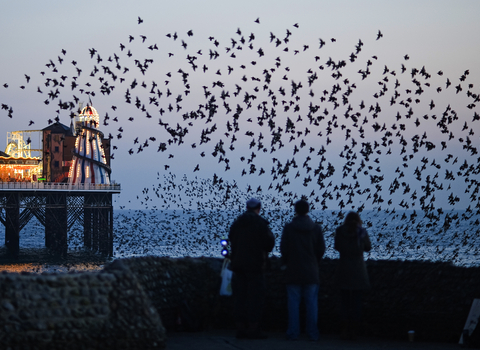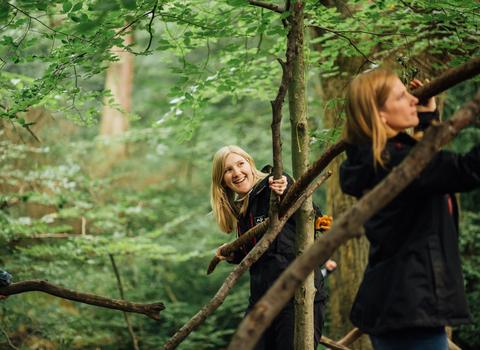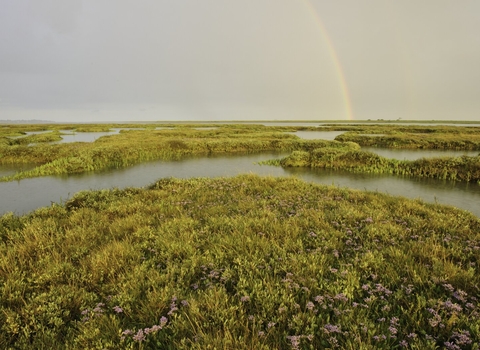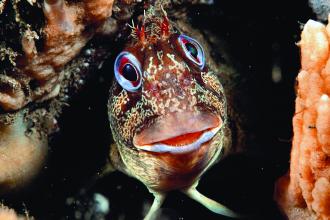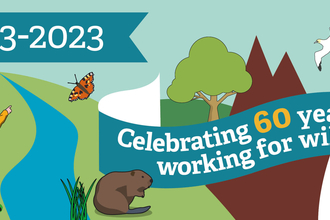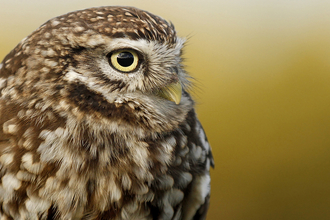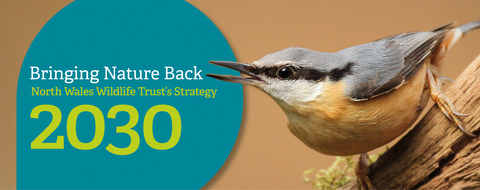
Photomontage © Jon Hawkins
Local Action. Collective Impact. Global Change.
We need to restore nature at a global scale, on land and at sea. And it needs to happen now. Our Strategy 2030 provides the high-level framework of how we intend to go about it.
Download your copy of Strategy 2030:
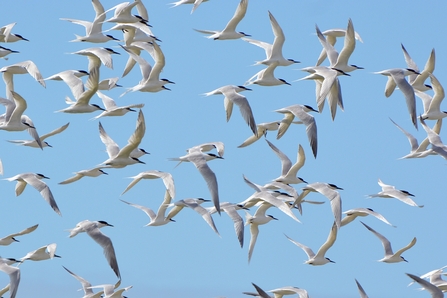
Cemlyn Sandwich Terns / Môr-wenoliaid pigddu Cemlyn © Henry Cook
Our Vision
Our vision is of a thriving natural world, with wildlife and natural habitats playing a valued role in addressing the climate and ecological emergencies, and people inspired and empowered to take action for nature.
Our Purpose
Our purpose is to bring wildlife back, to empower people to take action for nature, and to create a society where nature matters.
Three Strategic Goals
Our three strategic goals set out what we believe needs to happen by 2030 in pursuit of our longer term vision of a thriving natural world. Whilst set out as distinct, these goals are interdependent and highly connected, and achieving nature's recovery will require all three to be achieved.
Five Strategic Transformations
North Wales Wildlife Trust have identified five Transformations in our capabilities that are essential to achieve our Strategic Goals. Taken together, they will not only help us achieve our goals for 2030 but will also result in a stronger and more effective organisation for the longer term.
1) Inspiring communities to organise and mobilise, especially amongst young people
We know that if nature is to be restored at scale, we need many more people on nature’s side – and North Wales Wildlife Trust, embedded in local communities, can be an effective and inspirational facilitator for change.
North Wales Wildlife Trust has a dedicated network of committed volunteers who are crucial to our work. We will continue to embrace the activity they do while widening our scope to the many people within our communities trying to mobilise in a different way for a better world for nature.
We commit ourselves to re-imagining volunteering and community action; to becoming more open and inclusive; and to being led by our supporters.
We will need to broaden our skills beyond being volunteer managers and work more as community facilitators: enabling, inspiring, and catalysing a new cohort of community organisers and campaigners.
2) Undergoing a ‘root and branch’ digital transformation
The rapid advancement of digital technologies in recent years presents unprecedented opportunities to increase the impact of our work; to adopt innovative approaches to new and existing challenges; and to broaden and enhance our engagement. These advances have revolutionised the very nature of ‘community’, and the way in which people connect, organise and mobilise to bring about change is continuously evolving.
To deliver our strategy and build our resilience to a changing external digital landscape, we will need to transform our existing digital systems and infrastructure, and increase the capability of North Wales Wildlife Trust to store and handle data. This will require training to develop the digital skills and capabilities of our staff and volunteers; as well as addressing emerging risks in areas such as data ethics, access, protection and rights, and information security.
3) Delivering a step change in funding for nature’s recovery
The complexity and scope of achieving our vision is greater now than it has ever been, both because of the scale and urgency of the climate and ecological emergency, and its relevance to peoples’ lives and livelihoods. Delivering our strategy will therefore require a step change in scale and diversity of the funding available for nature’s recovery.
North Wales Wildlife Trust exists thanks to the strong funding base provided by our loyal members, now numbering over 9,000. This has been built up steadily through our local fundraising and marketing an approach that will always be key to our strength and distinctiveness.
However, expanding other potential sources of unrestricted income must also be a priority. We will need to explore new partnerships and business models, new ways of working and alternate sources of capital and financing – all while protecting our independence and integrity.
4) Forging new partnerships to drive forward nature’s recovery
North Wales Wildlife Trust directly manages a fraction of the land which is needed to support nature’s recovery. Our area covers 615,100h Ha – but we manage only 790 Ha (0.13%). Meanwhile, approximately 82% of the land of Wales is classified as agricultural land, meaning that nature’s recovery can only be achieved via a step change in our influence on how farmland is managed.
To deliver our strategy, we will need to engage with a wider and more diverse range of partners and actors within our communities and across administrative borders, embracing collaborative multi-stakeholder approaches to address common causes and achieve greater impact. This will mean opening ourselves up to more connections and transformative partnerships that prioritise collective action and joint problem-solving, including those outside the traditional, mainstream conservation sector.
5) Increasing our capacity to counter unsustainable activity in the marine environment
There is an ever-increasing need to build the resilience of the marine ecosystem in Wales through habitat restoration, maximising carbon sequestration and completing an ecologically coherent and well-managed network of Marine Protected Areas.
Demands on our seas for resources and energy are increasing, and North Wales has been identified as a key area for many offshore renewable projects. However, most present and proposed devices are located in biodiversity hotspots – including the nutrient-rich waters that attract many of the top predators which Wales is proud to support.
To deliver our strategy we must ensure that our seas are managed to recover from past damage, disturbance and neglect and ensure that future impact of development at sea is minimised. To do so we must proactively prioritise engaging with and influencing developers, policy makers and communities from early stages of project development.
Our Values and Beliefs
North Wales Wildlife Trust’s work is underpinned by the following fundamental values and beliefs.

Love for nature
Our love and respect for the intrinsic value of nature sits at the core of our skilled, motivated, and dedicated team. We will always ensure that our work and partnerships are driven by what’s right for nature.
Evidence-led innovation
We are evidence-based and solution-focused, working with partners and communities seeking innovative solutions to maximise our contribution and impact for nature.
Enthusiasm
A focused passion steers us to where we are uniquely placed to deliver the most impact for wildlife, enabling us to work enthusiastically with purpose and focus.
Integrity
We are committed to transparency and inclusivity within our actions and projects, co-designing with partners to deliver the greatest impact for nature. We will always uphold our values and beliefs and speak truth to power.
Respect
We work with respect for nature, respect for people, and respect for diversity. We work collaboratively and champion inclusion and diversity within our communities, being locally sensitive whilst ensuring that we have impact beyond our borders.
Building our collective impact and influence
By working together as The Wildlife Trusts and harnessing our collective impact, we are able to imagine, campaign and advocate for real change. We will achieve increased collective impact and gain greater influence by building on our successes, telling compelling stories, and empowering local communities to become agents of change.
Read on
North Wales Wildlife Trust is a corporate member of the Royal Society of Wildlife Trusts (RSWT): a registered charity in its own right, founded in 1912, and one of the founding members of IUCN – the International Union for the Conservation of Nature.
There are 46 individual Wildlife Trusts across the UK and Crown Dependencies, each of which is a place-based independent charity with its own legal identity, formed by groups of people getting together and working with others to make a positive difference to wildlife and future generations, starting where they live and work.
Taken together, this federation of 47 charities is known as The Wildlife Trusts.
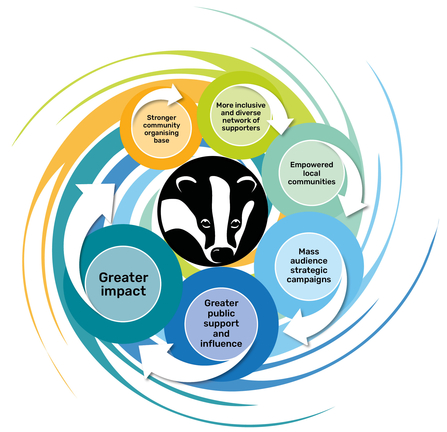
We need to restore nature at a global scale, on land and at sea. And it needs to happen now.

